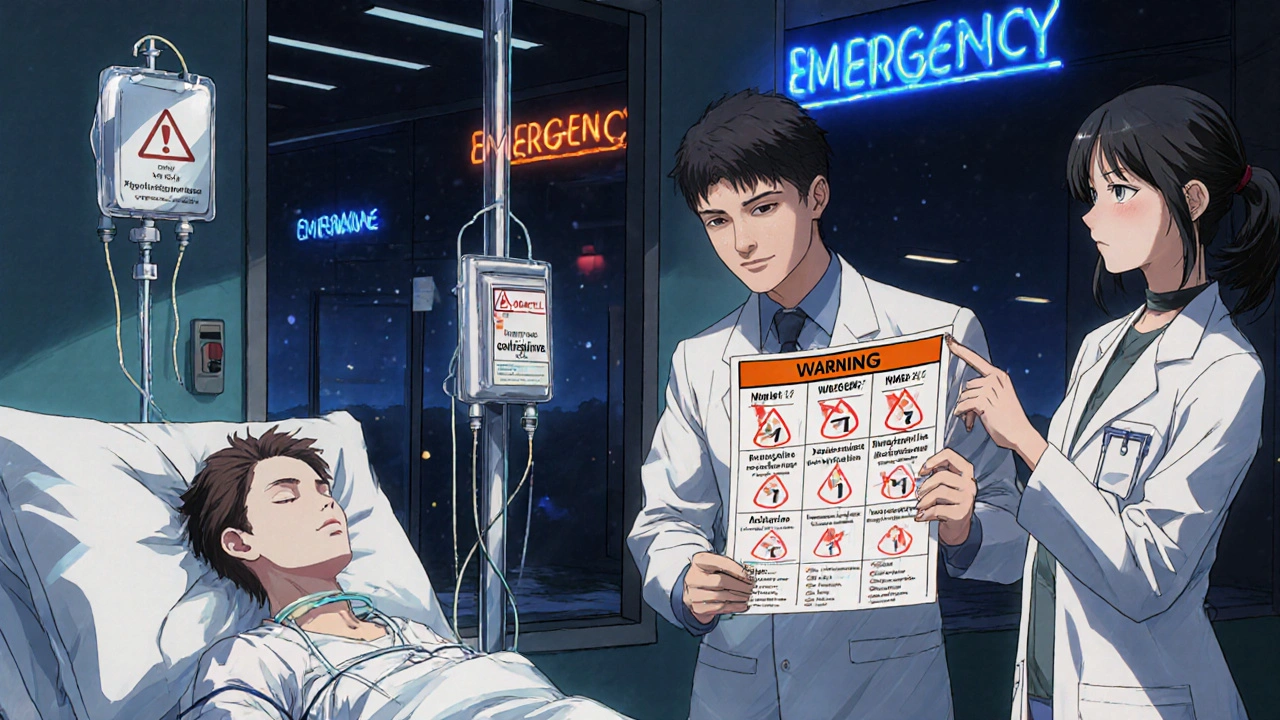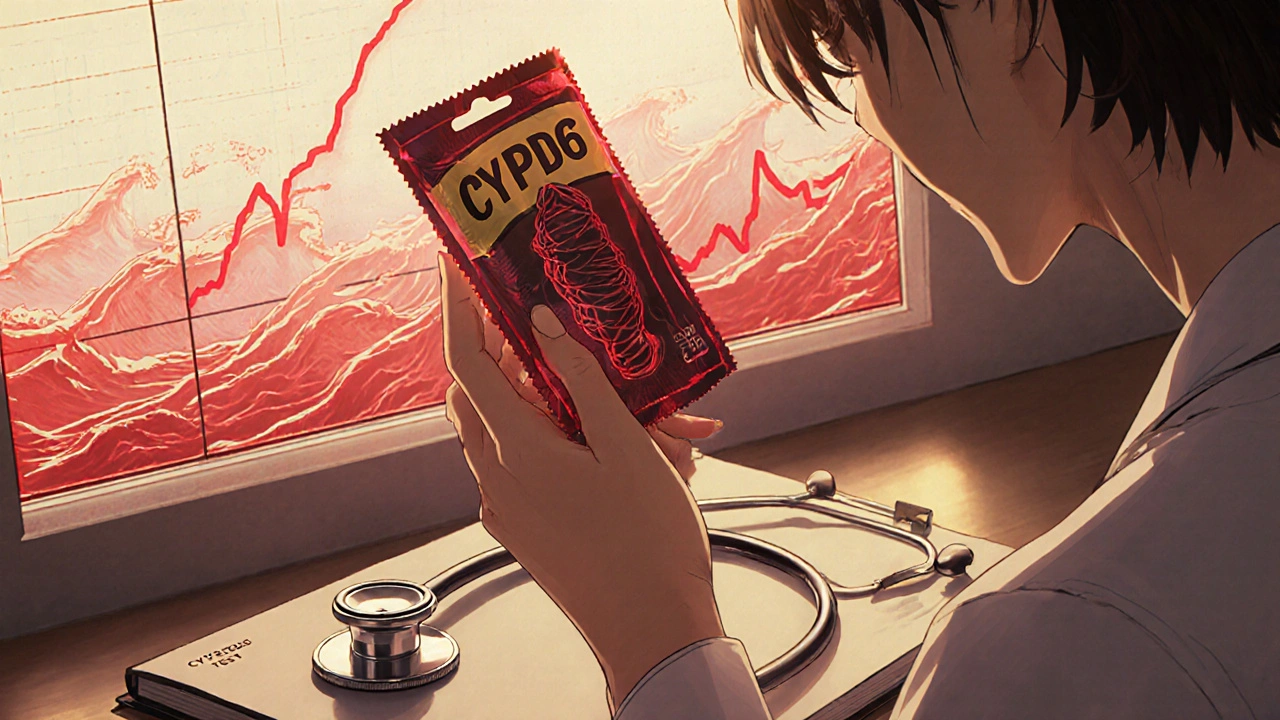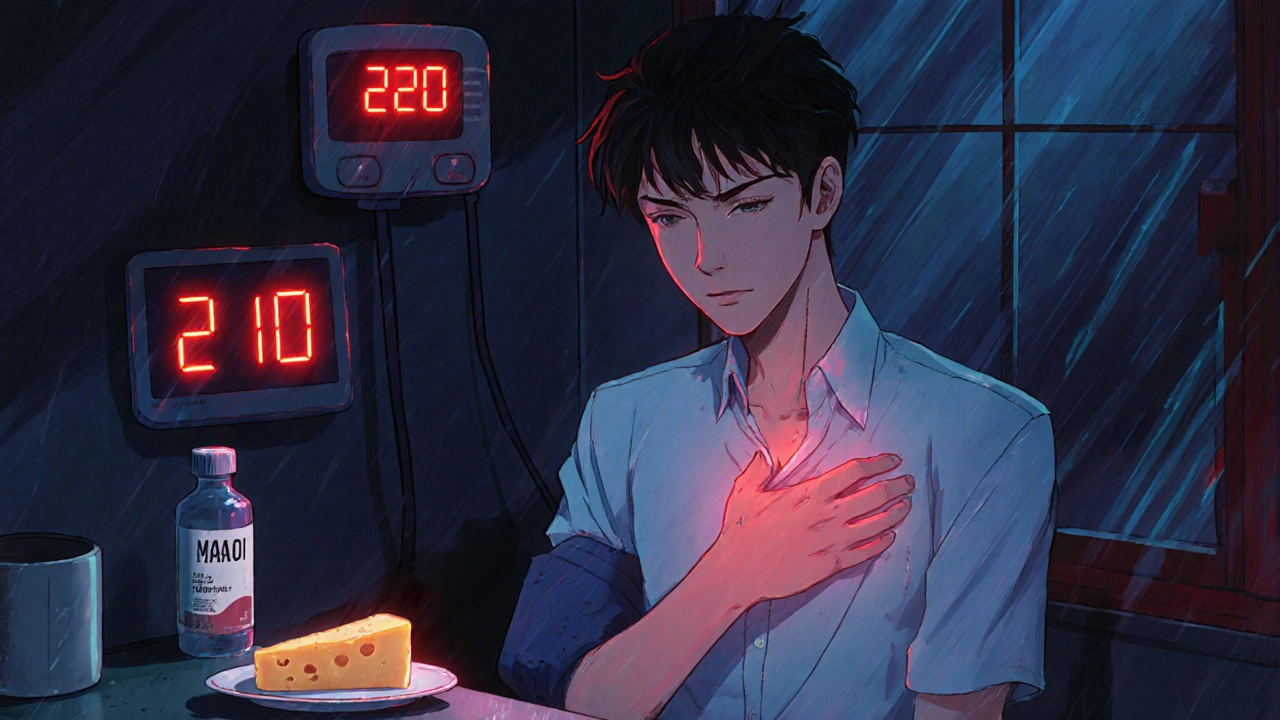Hypertensive Crisis Risk Checker
Check Your Medication Risks
This tool identifies dangerous combinations that could lead to a severe hypertensive crisis. Note: This is not a substitute for professional medical advice.
When your blood pressure spikes suddenly to 220/130 mmHg, it’s not just a bad day-it’s a medical emergency. A severe hypertensive crisis can strike without warning, often triggered by something as simple as a cold medicine, a piece of cheese, or a new prescription. This isn’t rare. Around 15-20% of all cases of sudden, dangerous high blood pressure come from drug interactions, and most people never see it coming.
What Exactly Is a Hypertensive Crisis?
A hypertensive crisis happens when blood pressure shoots past 180/120 mmHg. It’s not just high-it’s dangerously high. At this level, your arteries can’t handle the pressure. Blood vessels in your brain, kidneys, heart, and eyes start to leak, swell, or tear. If you don’t act fast, you could suffer a stroke, heart attack, kidney failure, or even die. There are two types: urgency and emergency. Urgency means your blood pressure is sky-high but your organs are still okay-for now. Emergency means damage is already happening. This is when you need to go to the hospital immediately. The difference? One can wait a few hours. The other can kill you in minutes.How Do Drugs Trigger This?
Most people think high blood pressure comes from being overweight, eating too much salt, or stress. But a surprising number of cases are caused by drugs-either alone or in combination. The real danger isn’t just one medication. It’s what happens when they mix. Take MAOIs, a class of antidepressants like phenelzine and selegiline. These drugs stop your body from breaking down tyramine, a chemical found in aged cheese, cured meats, soy sauce, and even some beers. If you eat these foods while on an MAOI, tyramine floods your system, forcing your body to release massive amounts of norepinephrine. That’s what causes blood pressure to spike-sometimes over 250 mmHg in under an hour. There are documented cases where people woke up with a pounding headache, blurred vision, and chest pain after eating a slice of cheddar. One Reddit user described spending three days in the ICU after a simple cheese sandwich. Then there’s venlafaxine, a common antidepressant. At doses above 300 mg/day, it can raise diastolic pressure above 90 mmHg. But the real problem? People take it with over-the-counter decongestants like pseudoephedrine or stimulants like Adderall. That combination can double the risk of crisis. A 2021 study found that patients on venlafaxine who also used nasal sprays for colds had 40% more hypertensive emergencies than those who didn’t. Cocaine is another major culprit. When taken with beta-blockers like propranolol, it causes unopposed alpha-receptor stimulation. That means your blood vessels constrict like a vise, with no way to relax. Systolic pressures over 220 mmHg are common. Emergency rooms see this often-especially in younger people who don’t realize mixing street drugs with prescriptions can be deadly.Other Hidden Triggers
It’s not just antidepressants and stimulants. Some of the most overlooked triggers are everyday items. Licorice candy might seem harmless, but it’s packed with glycyrrhizin, which blocks an enzyme that normally keeps cortisol from acting like a mineralocorticoid. The result? Your body holds onto sodium, loses potassium, and your blood volume swells by 10-15%. Blood pressure climbs slowly-over weeks-but once it hits 170/110, it doesn’t come down until you stop eating the candy. One patient in a 2022 case report had normal BP for years until she started eating a daily pack of licorice. Within two weeks, she was hospitalized. After quitting, her pressure dropped back to normal in 14 days. Cyclosporine, used after organ transplants, causes hypertension in up to half of patients. It’s often mistaken for organ rejection, so doctors increase the immunosuppressant dose-making the problem worse. Blood pressure spikes aren’t a side effect here-they’re a red flag that needs immediate attention. Even common painkillers like acetaminophen can nudge blood pressure up by 3-5 mmHg. That doesn’t sound like much, but if you’re already borderline hypertensive and taking other meds, that small push can tip you into crisis.
Why Is This So Often Missed?
Doctors aren’t ignoring you. The system is broken. A 2022 study found that 65% of emergency doctors never check a patient’s full medication list during a hypertensive crisis. They focus on the symptoms-headache, chest pain, confusion-and treat the pressure. They don’t ask about the cold medicine, the herbal supplement, or the cheese you ate last night. And it’s not just doctors. Patients don’t know to report these things. A 2021 survey showed that 68% of people who had a drug-induced crisis had complained of headaches or blurry vision before-but their doctors never connected the dots to their meds. FDA labels help, but they’re not enough. Only 12% of over-the-counter decongestants warn about blood pressure risks. Most people assume if it’s sold at the pharmacy, it’s safe. It’s not.Who’s at Highest Risk?
Not everyone who takes these drugs will have a crisis. But certain groups are far more vulnerable:- People on MAOIs who eat aged foods or take OTC cold meds
- Patients on venlafaxine at doses above 225 mg/day
- Those taking cyclosporine or other transplant drugs
- Individuals using stimulants (ADHD meds, weight-loss pills) with antidepressants
- Older adults on multiple prescriptions (polypharmacy)
- People with genetic variants in CYP2D6 enzyme-this affects how fast your body processes certain drugs

What Should You Do If You Suspect a Crisis?
Symptoms aren’t always obvious. You might feel:- Sudden, severe headache
- Blurred or double vision
- Chest pain or pressure
- Shortness of breath
- Nausea or vomiting
- Confusion or seizures
- For MAOI-tyramine crisis: IV phentolamine works in 92% of cases within 20 minutes.
- For cyclosporine-induced: Calcium channel blockers like amlodipine are first-line.
- For cocaine or stimulant reactions: Benzodiazepines (like lorazepam) calm the nervous system and lower pressure fast.
- For mineralocorticoid excess: Stop the trigger (like licorice) and use potassium-sparing diuretics.
How to Prevent It
Prevention isn’t complicated. It’s just rarely done.- If you’re on an MAOI: Avoid aged cheese, cured meats, soy sauce, tap beer, and fermented foods. Use the MAOI Diet Helper app-it’s been shown to improve adherence by 78%.
- Never mix venlafaxine with decongestants, stimulants, or weight-loss drugs. Talk to your pharmacist before taking anything new.
- Ask your doctor for a full medication review every 6 months, especially if you take 5+ drugs.
- Check OTC labels for warnings about high blood pressure. If it doesn’t say anything, assume it’s risky.
- Monitor your blood pressure at home if you’re on high-risk meds. Write it down. Bring it to appointments.
- If you’ve had one crisis, get genetic testing for CYP2D6 variants. It could save your life next time.
The Bigger Picture
Drug-induced hypertensive crises cost the U.S. healthcare system $2.3 billion a year-almost all preventable. The FDA has started requiring stronger warnings on MAOIs, and new AI tools are being tested to flag dangerous combinations before they happen. But technology alone won’t fix this. It takes two things: awareness and action. Patients need to speak up. Doctors need to listen. And everyone needs to stop treating high blood pressure as a “lifestyle issue” when it might be a deadly interaction hiding in plain sight. If you’re on medication and your blood pressure keeps climbing for no reason-look at your pills. Not your diet. Not your stress. Your pills. One change could be the difference between a hospital bed and a normal life.Can over-the-counter cold medicine cause a hypertensive crisis?
Yes. Decongestants like pseudoephedrine and phenylephrine can sharply raise blood pressure, especially when taken with antidepressants like venlafaxine, MAOIs, or certain stimulants. Even a single dose can trigger a crisis in high-risk individuals. Always check labels for warnings about high blood pressure, and never take them if you’re on these meds without talking to your doctor or pharmacist.
Is it safe to eat cheese if I’m on an MAOI?
No. Aged cheeses like cheddar, parmesan, blue cheese, and Swiss contain high levels of tyramine, which can cause a dangerous spike in blood pressure when combined with MAOIs. Even small amounts can trigger a crisis. Fresh cheeses like mozzarella, cottage cheese, and cream cheese are generally safe. If you’re unsure, use a reliable app like MAOI Diet Helper or ask your pharmacist for a list of safe foods.
How long does it take for blood pressure to return to normal after stopping the offending drug?
It depends on the drug. For MAOI-tyramine reactions, pressure can drop within hours after treatment. For cyclosporine or licorice-induced hypertension, it may take days to weeks. Mineralocorticoid effects from licorice can linger for up to 3 weeks after stopping, because the enzyme inhibition lasts longer than the substance itself. Always follow up with your doctor-even if you feel fine-because damage can continue silently.
Can genetic testing help prevent a hypertensive crisis?
Yes. About 7% of people have a genetic variation in the CYP2D6 enzyme that makes them slow metabolizers of certain antidepressants like venlafaxine. This means the drug builds up in their system faster, increasing the risk of dangerous blood pressure spikes. Genetic testing can identify these individuals before they start the medication, allowing doctors to choose safer alternatives. It’s not routine yet, but it’s becoming more accessible and is strongly recommended for those with a history of unexplained hypertension.
What should I do if my doctor dismisses my concerns about blood pressure changes?
Get a second opinion. If you’re on high-risk medications and notice rising blood pressure, headaches, or vision changes, don’t accept dismissal. Document your readings, list all medications (including supplements), and bring them to another provider. Many cases of drug-induced crisis are missed because symptoms are blamed on stress or aging. But if your pressure jumps suddenly after starting a new drug, it’s not coincidence-it’s a signal. You have the right to ask for a medication review and to be heard.


Andrew Baggley
November 20, 2025 AT 13:36Just had my doc slap me with a new script for anxiety-venlafaxine. I didn’t even know it could do this. Thanks for spelling it out like I’m not a walking pharmacy. I’m already ditching the Sudafed I bought last week. Better safe than ICU.
Frank Dahlmeyer
November 22, 2025 AT 11:50Look, I get it-people think high blood pressure is just about being fat or eating too much salt, but this? This is the silent assassin hiding in plain sight. I’ve seen it firsthand: my cousin, 42, healthy as a horse, runs marathons, takes his antidepressant like clockwork, then takes a NyQuil for a cold-and wakes up in the ER with a BP of 210/140. No warning. No symptoms until it’s too late. It’s not just about the meds, it’s about the combo. The system doesn’t warn you. The labels are written in invisible ink. And the worst part? Doctors don’t ask. They see ‘hypertension’ and they treat the number, not the cause. We need mandatory medication reconciliation at every ER visit. Not optional. Mandatory. Because someone’s life isn’t a guess. It’s a checklist waiting to be checked.
Codie Wagers
November 23, 2025 AT 10:56It’s not the drugs. It’s the illusion of control. You think you’re managing your health by taking pills, but you’re just outsourcing your biology to a corporate pharmacy chain that doesn’t care if you live or die-only if you refill. The FDA? A rubber stamp for Big Pharma. The real crisis isn’t hypertension-it’s the abdication of personal responsibility masked as medical authority. You want to live? Stop trusting labels. Stop trusting doctors. Stop trusting ‘safe’ OTC meds. Read the molecular pathways. Understand neurotransmitters. Or die quietly in your sleep, another statistic in the machine.
Paige Lund
November 23, 2025 AT 18:54So... cheese is now a weapon? Cool. I'll just add it to my list of things that'll kill me slowly, like WiFi and TikTok.
Reema Al-Zaheri
November 25, 2025 AT 18:24Thank you for this detailed, evidence-based breakdown. I am particularly concerned about the CYP2D6 polymorphism data-this is not widely known, even among clinicians. In my practice in India, we rarely test for pharmacogenomic variants due to cost and access barriers. However, the implications are profound: a single genetic variant can turn a routine prescription into a lethal cocktail. I urge all readers to request CYP2D6 testing if they are prescribed venlafaxine, SSRIs, or beta-blockers. This is not science fiction-it is clinical reality. Document your medications. Track your BP. Advocate for yourself. Knowledge is not optional-it is survival.
Zac Gray
November 27, 2025 AT 09:53Man, I used to think my headaches were just stress. Turns out I was popping Advil daily and taking Wellbutrin for depression. No one ever connected the dots. I started tracking my BP at home-went from 145/92 to 130/84 in three weeks after ditching the OTC painkillers. It’s not magic. It’s just paying attention. You don’t need a PhD to save your life. You just need to ask: ‘Could this be the problem?’ And then, you stop.
Steve and Charlie Maidment
November 27, 2025 AT 19:09Why are we even talking about this? Everyone knows you shouldn’t mix meds with food or other drugs. It’s common sense. If you’re dumb enough to eat blue cheese while on MAOIs, you deserve what you get. And don’t even get me started on people taking Adderall with antidepressants-like, what were you thinking? This isn’t a medical crisis. It’s a human one. People need to stop being lazy and read the damn label. Or just stop taking stuff. Problem solved.
Michael Petesch
November 29, 2025 AT 07:56This is an extraordinary and meticulously documented exposition on a critically underappreciated public health issue. The intersection of pharmacology, genetics, and behavioral compliance reveals systemic failures in both clinical education and patient communication. In Japan, where polypharmacy is increasingly common among the elderly, similar patterns emerge-yet public awareness remains minimal. I recommend translating this into multiple languages and distributing it through community pharmacies and primary care clinics. The cost of inaction is measured not only in dollars, but in lives.
Ellen Calnan
December 1, 2025 AT 01:16I used to think my blood pressure was ‘normal’-until I started having these terrifying headaches after eating a slice of pizza. I didn’t even know pizza had aged cheese. I was on an MAOI. I thought I was being careful. Turns out, I was just lucky. I almost died. Now I have a little card in my wallet: ‘MAOI USER-NO AGED CHEESE, NO COLD MEDS, NO ALCOHOL.’ I show it to every pharmacist. I show it to my family. I show it to strangers at the grocery store. Because if I didn’t speak up, no one else would. And someone else might die because they didn’t know. So I speak. Loudly. Repeatedly. Because silence kills.
Richard Risemberg
December 2, 2025 AT 08:45Let’s be real-this isn’t just about meds or cheese or cold pills. It’s about how we treat our bodies like vending machines: pop in a pill, get a result, no questions asked. But your body isn’t a Coke machine-it’s a symphony orchestra. One wrong note, and the whole thing collapses. MAOIs? They’re like the conductor who’s been silenced. Tyramine? That’s the rogue percussionist smashing the timpani. And we’re all just standing there, wondering why the music turned to noise. The fix? Listen. Pay attention. Don’t just take the pill-know the song. Your life isn’t a script. It’s a live performance. Don’t let someone else write your score.
Andrew Montandon
December 2, 2025 AT 11:28Big thanks to the OP-this is gold. I’ve been on cyclosporine since my kidney transplant, and my BP has been climbing for months. My doc kept saying it was ‘stress’ or ‘aging.’ I pushed back. Asked about the drug. They finally checked. Turns out, cyclosporine was the culprit. We switched my immunosuppressant, and my pressure dropped 30 points in a week. Don’t let anyone dismiss you. If your BP is climbing for no reason-look at your pills. Not your diet. Not your stress. Your pills. And bring a list. Write it down. Print it. Bring it to every appointment. You’re not being annoying-you’re being smart.
Sam Reicks
December 4, 2025 AT 10:44Chuck Coffer
December 4, 2025 AT 23:17Wow. So the solution is to live in fear of every food, every pill, every breath? You’re not helping. You’re scaring people into paralysis. If you’re that worried, don’t take meds. Don’t eat anything processed. Move to a cave. Maybe then you’ll live to 120. Until then, stop playing doctor. Your post reads like a pharmaceutical fear campaign. Most people are fine. You’re just selling anxiety as knowledge.
Marjorie Antoniou
December 6, 2025 AT 15:57I’ve been on an MAOI for 8 years. I didn’t know about the licorice thing until I read this. I ate a bag of black licorice last winter because I thought it was ‘natural.’ I ended up with a pounding headache and swollen ankles. My doctor didn’t ask about candy. I didn’t think to mention it. Thank you for making me feel less alone. I’m printing this out and giving it to my pharmacist. You’re right-no one’s talking about this. But now they will. Because someone cared enough to write it down.